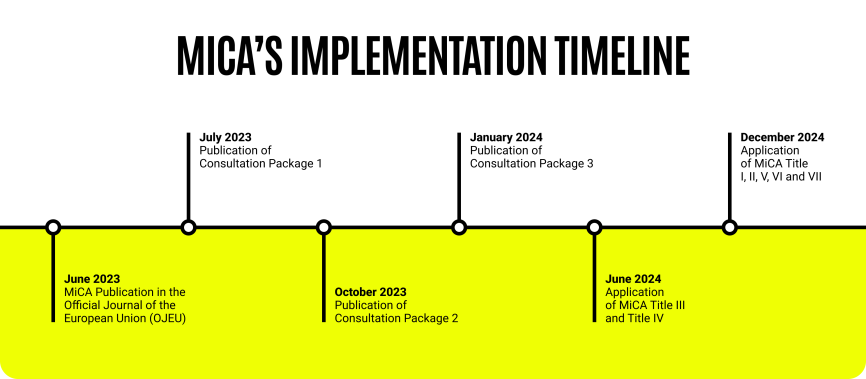What is MiCA?
MiCA (Markets in Crypto-Assets Regulation) is the European Union’s legal framework that standardizes regulations for digital asset issuers, trading platforms, and custody providers.
Table of contents:
MiCA is short for Markets in Crypto-Assets Regulation. It represents the European Union’s first comprehensive legal framework designed specifically for crypto-assets. MiCA establishes uniform rules across all EU member states, covering digital asset issuers, trading platforms, and custody service providers.
MiCA removes conflicting national rules by creating one clear EU system. It requires licenses, sets rules for stablecoins, and demands detailed information sharing. The regulation also strengthens efforts against money laundering and terrorist financing.
The core objective of MiCA is to increase market transparency and protect users. By introducing a single market license, it simplifies cross-border operations for crypto businesses and crypto service providers, which allows hassle-free activity throughout the EU.

What Entities Are Subject to MiCA Regulation?
MiCA governs issuers of crypto-assets and crypto-asset service providers (CASPs). The regulation applies to entities involved in creating, offering, or facilitating the use of digital assets across the EU.
The main entities covered by MiCA include:
- Crypto-asset service providers (CASPs). Entities that provide key services such as exchange between fiat and crypto or crypto-to-crypto, custody, order execution, asset placement, and trading platform operations. Authorization is required before these providers can operate legally within the EU.
- Electronic Money Token (EMT) issuers. Entities issuing stablecoins pegged to a single legal tender, for example, the Euro.
- Asset-Referenced Token (ART) issuers. Entities issuing stablecoins backed by multiple assets, such as fiat currencies, cryptocurrencies, or commodities.
- Crypto-asset issuers. Legal entities that offer digital assets to the public within the EU. These issuers must register in the EU, publish a compliant whitepaper, and comply with strict transparency and disclosure standards.
- Other crypto-asset issuers. This category includes utility tokens, which grant access to specific applications or services. Issuers of these tokens should meet disclosure requirements, though regulations are less stringent than those applied to stablecoins.
Excluded from MiCA’s scope are security tokens (regulated under MiFID II), genuinely unique non-fungible tokens (NFTs), and central bank digital currencies (CBDCs).
Requirements and Provisions Under MiCA
MiCA imposes strict operational and regulatory obligations on CASPs and issuers to foster a safe, transparent, and harmonized crypto market within the EU.
Essential requirements are:
- Appointing at least one director residing in the same member state.
- Providing clear, upfront risk information prior to transactions.
- Adhering to EU AML and CTF regulations.
- Establishing a registered office within an EU member state.
- Implementing internal policies for data security, risk management, and service continuity.
- Maintaining transparent pricing and fee disclosures.
- Securing authorization from national regulators before commencing operations.
- Setting up accessible complaint-handling procedures.
The regulation’s core provisions further include:
- Enhanced oversight of stablecoins, including capital, reserve, and governance requirements for ART and EMT issuers.
- Regulatory supervision is divided between national authorities for local firms and the European Securities and Markets Authority (ESMA) for cross-border and stablecoin-specific issues.
- Comprehensive transparency standards, demanding whitepapers with accurate, detailed information about the crypto-assets.
- A licensing system that applies to all crypto-asset issuers and service providers across the EU.
- User protection through bans on misleading promotions and mandatory fair communication.
- Disclosure of environmental impact related to crypto activities.
What Are the Benefits of MiCA Compliance for Companies?
MiCA provides a unified, legally certain framework for crypto businesses aiming to operate throughout the EU.
Compliance delivers multiple strategic advantages:
- The ability to operate smoothly in all 27 EU member states with a single authorization.
- Increased trust from partners, regulators, and users through adherence to MiCA standards.
- Clear and consistent rules that replace fragmented national laws, which make compliance easier.
- A level playing field with common standards that reduce regulatory loopholes and unfair advantages.
- Confidence is supported by mandatory disclosures and transparent communication.
- A stable legal environment that encourages the creation of innovative crypto products.
Crypto Regulation (Video)
Start your crypto journey today. Watch the video and learn from CoinsPaid experts.
You’ll learn why regulation matters, how it protects users and businesses, and what compliance means in the context of crypto payments.
Discover the world of cryptocurrency with us. Watch the video and learn to build a successful business with CoinsPaid Crypto Academy.
Conclusion
MiCA (Markets in Crypto-Assets Regulation) is the EU’s landmark regulation designed to harmonize crypto-related activities across all member states. It introduces a single licensing regime, robust compliance standards, and transparent disclosure requirements for crypto-asset issuers, service providers, and stablecoin operators.
For businesses, especially those offering services like custody, exchange, or token issuance, MiCA delivers clarity, legal certainty, and easier access to the entire EU market. By establishing consistent rules, it helps create a more secure, transparent, and trusted environment for both crypto companies and their users. Firms that align with MiCA gain a competitive edge, signaling regulatory reliability and long-term viability.
Whether you’re building a startup or scaling across the EU, understanding and preparing for MiCA is now essential to future-proof your operations and meet evolving compliance expectations.
Other Terms from the Crypto Industry